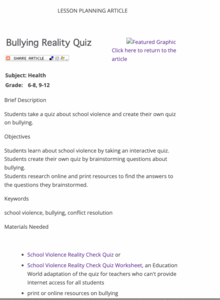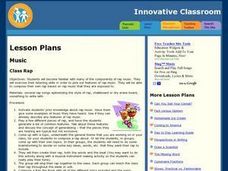Angel Island Immigration Station Foundation
Interview a Family or Community Member: Taking Oral Histories
Young scholars gain insight into how historians record events by engaging in an oral history project. In preparation, class members brainstorm open-ended interview questions and take part in and debrief a mock interview simulation....
Learning to Give
We Can Help to Make a Change!
The importance of accepting those who are different is the subject of a service learning project. Upper graders craft presentations for younger learners on ways to include everyone in the school community and to decrease the feelings of...
Bully Free Systems
Bully Free Lesson Plans—Eighth Grade
Middle schoolers are likely very familiar with the concept of bullying and cliques. Discuss their experiences and brainstorm ways to handle peer conflict and feelings of exclusion with a poem that focuses on bullying, and a second lesson...
Curated OER
1880s Agricultural Nation: Foods and Families on the Move
Students complete activities to learn about the agriculture during the 1880s. In this agricultural history lesson plan, students discuss the brainstorm questions about their neighborhood and its agricultural history. Students research to...
Curated OER
Belonging
Middle schoolers examine their personal feelings regarding exclusive groups. In this character education lesson, students conduct mini-debates as they discuss how they relate to one another regarding exclusive social groups.
Curated OER
Using Literature to Teach Bullying
Learners explore signs and types of bullying. In this "building character" lesson, students listen to several read alouds based on a bully theme. Four groups are formed to discuss "gossip", "exclusion", "physical bullying", and "verbal...
Curated OER
Competition/Cooperation Relationships
Students view the PowerPoint slide of a lynx and hare and discuss what would happen if all the lynxes were destroyed. They then take notes on the lesson and brainstorm about other competitive/cooperative relationships as well as discuss...
Texas Center for Learning Disabilities
Chapter 15 Teacher Guide and Student Log
Following the routines established in the initial lessons in this series that uses Iqbal as a core text, kids complete their reading of Francesco D'Adamo's novel about child labor.
Curated OER
Risk Taker - Probability Web Quest
Students complete an on line, teacher created, webquest to study the origin of probability, theoretical and simulated probability; computing the probability of two independent events; and mutually exclusive events. They make a Venn...
Curated OER
What is Bullying?
Students brainstorm ideas or create a definition of what bullying is. They write their ideas on the board. They then break into cooperative groups giving each group a form of bullying from a list and discussing it among themselves.
Curated OER
Can We Breathe Easier?
Students list the exclusive and shared powers of the state and national governments. They state the specific role of the national and state governments in enforcing environmental legislation.
Curated OER
Rumpelstiltskin, Private Eye
Learners prepare a classroom theater presentation of Rumpelstitskin in which the narrator is a private eye. They write the defense of one of the characters who conspired against the king and play a vocabulary game.
Curated OER
Bullying Reality Quiz
Young scholars take a quiz about school violence and create their own quiz on bullying.
Curated OER
Class Rap
Students explore rap music and its components. They listen to examples of rap music and discuss their common features. After selecting a topic, they compose a rap with both words and the beat and sing it to the class. As a class they...















